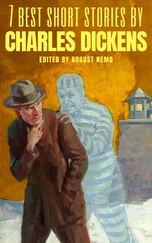Charles Dickens - Pearl-Fishing; Choice Stories from Dickens' Household Words; Second Series
Здесь есть возможность читать онлайн «Charles Dickens - Pearl-Fishing; Choice Stories from Dickens' Household Words; Second Series» — ознакомительный отрывок электронной книги совершенно бесплатно, а после прочтения отрывка купить полную версию. В некоторых случаях можно слушать аудио, скачать через торрент в формате fb2 и присутствует краткое содержание. ISBN: , Издательство: Иностранный паблик, Жанр: foreign_prose, на английском языке. Описание произведения, (предисловие) а так же отзывы посетителей доступны на портале библиотеки ЛибКат.
- Название:Pearl-Fishing; Choice Stories from Dickens' Household Words; Second Series
- Автор:
- Издательство:Иностранный паблик
- Жанр:
- Год:неизвестен
- ISBN:http://www.gutenberg.org/ebooks/50334
- Рейтинг книги:5 / 5. Голосов: 1
-
Избранное:Добавить в избранное
- Отзывы:
-
Ваша оценка:
- 100
- 1
- 2
- 3
- 4
- 5
Pearl-Fishing; Choice Stories from Dickens' Household Words; Second Series: краткое содержание, описание и аннотация
Предлагаем к чтению аннотацию, описание, краткое содержание или предисловие (зависит от того, что написал сам автор книги «Pearl-Fishing; Choice Stories from Dickens' Household Words; Second Series»). Если вы не нашли необходимую информацию о книге — напишите в комментариях, мы постараемся отыскать её.
Pearl-Fishing; Choice Stories from Dickens' Household Words; Second Series — читать онлайн ознакомительный отрывок
Ниже представлен текст книги, разбитый по страницам. Система сохранения места последней прочитанной страницы, позволяет с удобством читать онлайн бесплатно книгу «Pearl-Fishing; Choice Stories from Dickens' Household Words; Second Series», без необходимости каждый раз заново искать на чём Вы остановились. Поставьте закладку, и сможете в любой момент перейти на страницу, на которой закончили чтение.
Интервал:
Закладка:
The line of the Rockvilles was evidently running fast out. It had reached the extremity of imbecility and contempt – it must soon reach its close.
Sir Roger used to make his regular annual visit to town; but of late, when there, he had wandered restlessly about the streets, peeping into the shop-windows; and if it rained, standing under entries for hours together, till it was gone over. The habit of lurking and peering about, was upon him; and his feet bore him instinctively into those narrow and crowded alleys where swarm the poachers of the city – the trespassers and anglers in the game preserves and streams of humanity. He had lost all pleasures in his club; the most exciting themes of political life retained no piquancy for him. His old friends ceased to find any pleasure in him. He was become the driest of all dry wells. Poachers, and anglers, and Methodists, haunted the wretched purlieus of his fast fading-out mind, and he resolved to go to town no more. His whole nature was centred in his woods. He was forever on the watch; and when at Rockville again, if he heard a door clap when in bed, he thought it a gun in his woods, and started up, and was out with his keepers.
Of what value was that magnificent estate to him? – those superb woods; those finely-hanging cliffs; that clear and riant river coming travelling on, and taking a noble sweep below his windows, – that glorious expanse of neat verdant meadows stretching almost to Stockington, and enlivened by numerous herds of the most beautiful cattle – those old farms and shady lanes overhung with hazel and wild rose; the glittering brook, and the songs of woodland birds – what were they to that worn-out old man, that victim of the delusive doctrine of blood, of the man-trap of an hereditary name?
There the poet could come, and feel the presence of divinity in that noble scene, and hear sublime whispers in the trees, and create new heavens and earths from the glorious chaos of nature around him, and in one short hour live an empyrean of celestial life and love. There could come the very humblest children of the plebeian town, and feel a throb of exquisite delight pervade their bosoms at the sight of the very flowers on the sod, and see heaven in the infinite blue above them. And poor Sir Roger, the holder, but not the possessor of all, walked only in a region of sterility, with no sublimer ideas than poachers and trespassers – no more rational enjoyment than the brute indulgence of hunting like a ferret, and seizing his fellow-men like a bull-dog. He was a specimen of human nature degenerated, retrograded from the divine to the bestial, through the long-operating influences of false notions and institutions, continued beyond their time. He had only the soul of a keeper. Had he been only a keeper, he had been a much happier man.
His time was at hand. The severity which he had long dealt out towards all sorts of offenders made him the object of the deepest vengeance. In a lonely hollow of his woods, watching at midnight with two of his men, there came a sturdy knot of poachers. An affray ensued. The men perceived that their old enemy, Sir Roger, was there; and the blow of a hedge-stake stretched him on the earth. His keepers fled – and thus ignominiously terminated the long line of the Rockvilles. Sir Roger was the last of his line, but not of his class. There is a feudal art of sinking, which requires no study; and the Rockvilles are but one family among thousands who have perished in its practice.
In Great Stockington there lived a race of paupers. From the year of the 42d of Elizabeth, or 1601, down to the present generation, this race maintained an uninterrupted descent. They were a steady and unbroken line of paupers, as the parish books testify. From generation to generation their demands on the parish funds stand recorded. There were no lacunæ in their career; there never failed an heir to these families; fed on the bread of idleness and legal provision, these people nourished, increased, and multiplied. Sometimes compelled to work for the weekly dole which they received, they never acquired a taste for labor, or lost the taste for the bread for which they did not labor. These paupers regarded this maintenance by no means as a disgrace. They claimed it as a right, – as their patrimony. They contended that one-third of the property of the Church had been given by benevolent individuals for the support of the poor, and that what the Reformation wrongfully deprived them of, the great enactment of Elizabeth rightfully – and only rightfully – restored.
Those who imagine that all paupers merely claimed parish relief because the law ordained it, commit a great error. There were numbers who were hereditary paupers, and that on a tradition carefully handed down, that they were only manfully claiming their own. They traced their claims from the most ancient feudal times, when the lord was as much bound to maintain his villein in gross, as the villein was to work for the lord. These paupers were, in fact, or claimed to be, the original adscripti glebæ , and to have as much a claim to parish support as the landed proprietor had to his land. For this reason, in the old Catholic times, after they had escaped from villenage by running away and remaining absent from their hundred for a year and a day, dwelling for that period in a walled town, these people were among the most diligent attendants at the Abbey doors, and when the Abbeys were dissolved, were, no doubt, among the most daring of these thieves, vagabonds, and sturdy rogues, who, after the Robin Hood fashion, beset the highways and solitary farms of England, and claimed their black mail in a very unceremonious style. It was out of this class that Henry VIII. hanged his seventy-two thousand during his reign, and, as it is said, without appearing materially to diminish their number.
That they continued to “increase, multiply, and replenish the earth,” overflowing all bounds, overpowering by mere populousness all the severe laws against them of whipping, burning in the hand, in the forehead or the breast, and hanging, and filling the whole country with alarm, is evident by the very act itself of Elizabeth.
Among these hereditary paupers who, as we have said, were found in Stockington, there was a family of the name of Deg. This family had never failed to demand and enjoy what it held to be its share of its ancient inheritance. It appeared from the parish records, that they had practised in different periods the crafts of shoe-making, tailoring, and chimney-sweeping; but since the invention of the stocking frame, they had, one and all of them, followed the profession of stocking-weavers, or as they were there called, stockingers. This was a trade which required no extreme exertion of the physical or intellectual powers. To sit in a frame, and throw the arms to and fro, was a thing that might either be carried to a degree of extreme diligence, or be let down into a mere apology for idleness. An “idle stockinger” was there no very uncommon phrase, and the Degs were always classed under that head. Nothing could be more admirably adapted than this trade for building a plan of parish relief upon. The Degs did not pretend to be absolutely without work, or the parish authorities would soon have set them to some real labor, – a thing that they particularly recoiled from, having a very old adage in the family, that “hard work was enough to kill a man.” The Degs were seldom, therefore, out of work, but they did not get enough to meet and tie. They had but little work if times were bad, and if they were good, they had large families and sickly wives or children. Be times what they would, therefore, the Degs were due and successful attendants at the parish pay-table. Nay, so much was this a matter of course, that they came at length not even to trouble themselves to receive their pay, but sent their young children for it; and it was duly paid. Did any parish officer, indeed, turn restive, and decline to pay a Deg, he soon found himself summoned before a magistrate, and such pleas of sickness, want of work, and poor earnings brought up, that he most likely got a sharp rebuke from the benevolent but uninquiring magistrate, and acquired a character for hard-heartedness that stuck to him.
Читать дальшеИнтервал:
Закладка:
Похожие книги на «Pearl-Fishing; Choice Stories from Dickens' Household Words; Second Series»
Представляем Вашему вниманию похожие книги на «Pearl-Fishing; Choice Stories from Dickens' Household Words; Second Series» списком для выбора. Мы отобрали схожую по названию и смыслу литературу в надежде предоставить читателям больше вариантов отыскать новые, интересные, ещё непрочитанные произведения.
Обсуждение, отзывы о книге «Pearl-Fishing; Choice Stories from Dickens' Household Words; Second Series» и просто собственные мнения читателей. Оставьте ваши комментарии, напишите, что Вы думаете о произведении, его смысле или главных героях. Укажите что конкретно понравилось, а что нет, и почему Вы так считаете.












